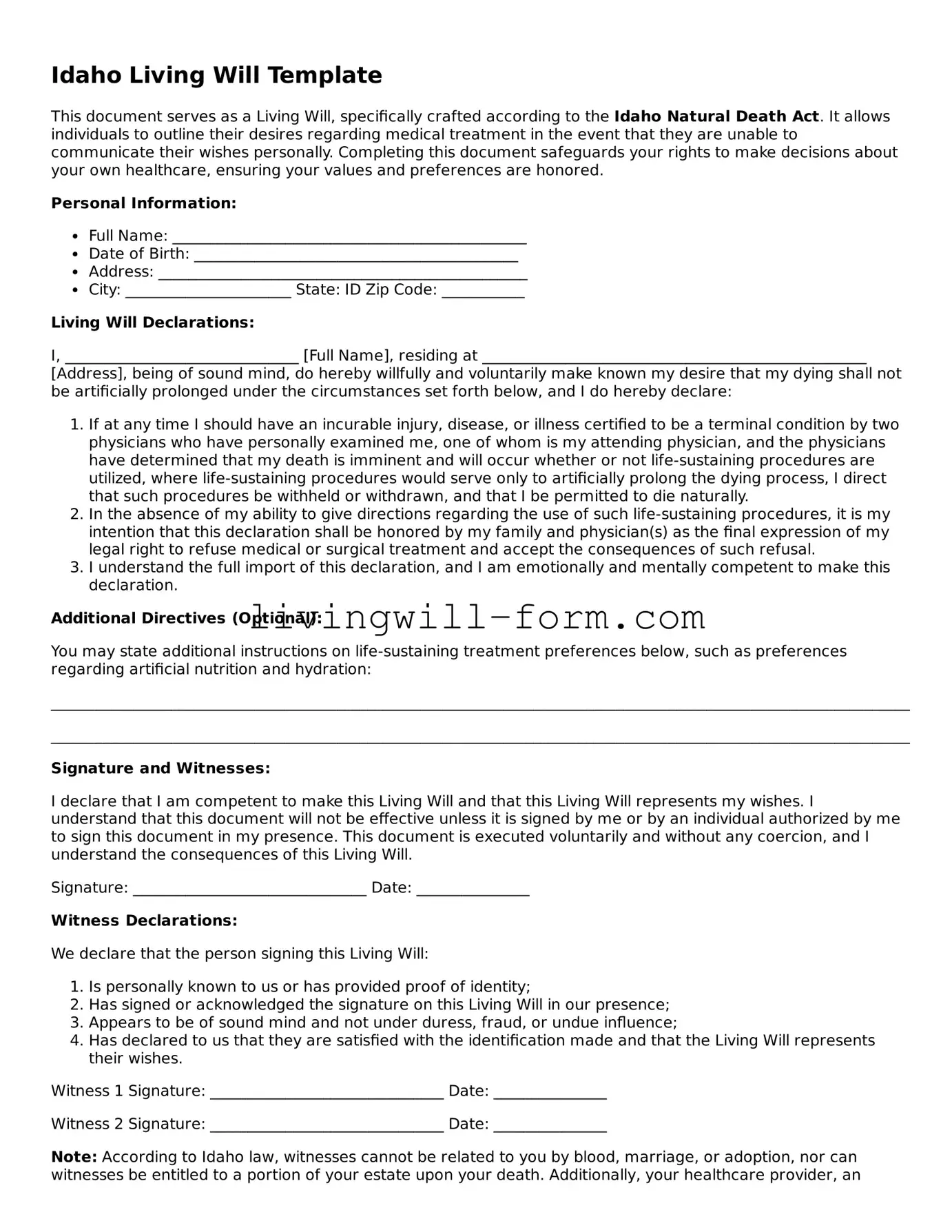Idaho Living Will Template
This document serves as a Living Will, specifically crafted according to the Idaho Natural Death Act. It allows individuals to outline their desires regarding medical treatment in the event that they are unable to communicate their wishes personally. Completing this document safeguards your rights to make decisions about your own healthcare, ensuring your values and preferences are honored.
Personal Information:
- Full Name: _______________________________________________
- Date of Birth: ___________________________________________
- Address: _________________________________________________
- City: ______________________ State: ID Zip Code: ___________
Living Will Declarations:
I, _______________________________ [Full Name], residing at ___________________________________________________ [Address], being of sound mind, do hereby willfully and voluntarily make known my desire that my dying shall not be artificially prolonged under the circumstances set forth below, and I do hereby declare:
- If at any time I should have an incurable injury, disease, or illness certified to be a terminal condition by two physicians who have personally examined me, one of whom is my attending physician, and the physicians have determined that my death is imminent and will occur whether or not life-sustaining procedures are utilized, where life-sustaining procedures would serve only to artificially prolong the dying process, I direct that such procedures be withheld or withdrawn, and that I be permitted to die naturally.
- In the absence of my ability to give directions regarding the use of such life-sustaining procedures, it is my intention that this declaration shall be honored by my family and physician(s) as the final expression of my legal right to refuse medical or surgical treatment and accept the consequences of such refusal.
- I understand the full import of this declaration, and I am emotionally and mentally competent to make this declaration.
Additional Directives (Optional):
You may state additional instructions on life-sustaining treatment preferences below, such as preferences regarding artificial nutrition and hydration:
__________________________________________________________________________________________________________________
__________________________________________________________________________________________________________________
Signature and Witnesses:
I declare that I am competent to make this Living Will and that this Living Will represents my wishes. I understand that this document will not be effective unless it is signed by me or by an individual authorized by me to sign this document in my presence. This document is executed voluntarily and without any coercion, and I understand the consequences of this Living Will.
Signature: _______________________________ Date: _______________
Witness Declarations:
We declare that the person signing this Living Will:
- Is personally known to us or has provided proof of identity;
- Has signed or acknowledged the signature on this Living Will in our presence;
- Appears to be of sound mind and not under duress, fraud, or undue influence;
- Has declared to us that they are satisfied with the identification made and that the Living Will represents their wishes.
Witness 1 Signature: _______________________________ Date: _______________
Witness 2 Signature: _______________________________ Date: _______________
Note: According to Idaho law, witnesses cannot be related to you by blood, marriage, or adoption, nor can witnesses be entitled to a portion of your estate upon your death. Additionally, your healthcare provider, an employee of a healthcare provider, or an operator or an employee of a healthcare facility cannot serve as witnesses.

